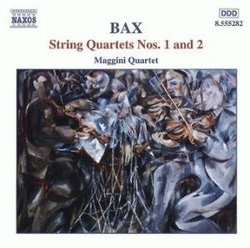| All Artists: Arnold Bax, Maggini Quartet Title: Bax: String Quartets Nos. 1 & 2 Members Wishing: 0 Total Copies: 0 Label: Naxos Original Release Date: 1/1/2002 Re-Release Date: 1/15/2002 Genre: Classical Styles: Chamber Music, Historical Periods, Classical (c.1770-1830) Number of Discs: 1 SwapaCD Credits: 1 UPC: 747313528226 |
Search - Arnold Bax, Maggini Quartet :: Bax: String Quartets Nos. 1 & 2
 | Arnold Bax, Maggini Quartet Bax: String Quartets Nos. 1 & 2 Genre: Classical
|
Larger Image |
CD Details |
CD ReviewsBax Masters Thomas F. Bertonneau | Oswego, NY United States | 06/01/2002 (5 out of 5 stars) "The music of Sir Arnold Trevor Bax (1883-1953) is always identifiable but it does not always immediately betray itself. A case in point is the First String Quartet (1918), where the bouncy first subject of the opening Allegro brings to mind Dvorak at his sunniest: at its reprise, the tune sounds slightly more Irish than previously and one begins to think about the composer of "In Memoriam," "The Garden of Fand," and "Tintagel" - English by birth but Irish and Scots by self-election. Once, Bax's First Quartet (in G Major) was the most played of British entries in the genre; he wrote three such works altogether to which he admitted, and there were one or two student efforts. The First has been recorded before, most recently on a Chandos disc as part of that label's heroic though latterly fretful Bax project. For any work so fine as Bax's First String Quartet, it is good to have more than one recording. The new performance on Naxos by the Maggini Quartet by no means requires the retirement of the now twenty-year-old performance by the English String Quartet; rather it enriches our understanding of the score by approaching the three movements in ways that differ from the interpretation offered on the Chandos standby. The most noticeable difference comes in the middle movement, to which the Maggini Quartet brings a greater feeling of plasticity than the English Quartet - imbuing it with a slightly, a very slightly, darker atmosphere. Subtle though the difference is, the ear hears it and the musical imagination remarks it. In the management of transitions, from one subject or section to another, the Maggini Quartet creates a greater sense of flow than the English Quartet. The English Quartet, on the other hand, marks the rhythms of the sprightly outer movements more heavily, and with good effect, than their counterparts on the Naxos disc. In the Third Movement, the lovely Irish tune bears a heavier weight of nostalgia under the Maggini Quartet than under their counterparts on Naxos. Here especially the two performances nicely complement one another. The Second Quartet too shows subtle differences in the Maggini performance. This is natural, as prior to the English Quartet's recording for Chandos (coupled with Bax's Piano Quintet), there was no living "tradition" for this score. (Nor will there be for the Third, should anyone get around to performing or recording it; it will be for the pioneers to set the tone.) To my ears, the Maggini reading minds the transitions with more success than the old one on Chandos, as fine as that remains. The Second is a bigger work than the First, closer in its procedures to the two symphonies (his First and Second) that Bax wrote in the first half of the 1920s. Despite what some commentators say, however, the Second Quartet does not really inhabit the same dejected and angry realm as the Second Symphony; the pathos of the Symphony is at a higher pitch than in the Quartet, although the latter boasts some darkly elegiac music, beginning with the improvisatory cello solo that opens the first movement. Michael Kasnowski is the cellist. He understands something important about Bax's music: that if the melodic line is not thoroughly thought out and sculpted with cognizance of the whole, the phrases can sound awkward and inarticulate; Bax needs executive nuance in his musical joints to sound effective. The sound on the Naxos disc is also more appropriate to Bax than that on the older disc, which dates (after all) from twenty years ago. The Naxos recorded sound is mellow, without the high-note harshness of early digital recording; the Maggini Quartet players are not so close-up as their precursors in this repertory, either, and this benefits both scores. In sum: a splendid disc made all the more attractive because of the comparatively low tariff. Baxians will definitely want the new disc as a complement to the pioneering Chandos issue." Excellent playing of at least somewhat interesting music G.D. | Norway | 02/17/2009 (4 out of 5 stars) "Bax's chamber music has never acquired the status of his most famous orchestral works, and there is frankly no wonder why - his ability to create nuanced colors, even auditory equivalents of temperature with the orchestra (never mind that some people find his works a little over-orchestrated) just isn't captured by these smaller forces. His string quartets are, however, still fine works and worth hearing, especially in performances as good as these.
The first quartet is clearly inspired by the Dvorak quartets, and the slow movement is atmospheric and the finale pleasantly jaunty. The second quartet is more serious and more difficult. The first movement is surprisingly devoid of Baxian atmosphere and even the second is a little nervous - whereas the sanguinity of the third is offset by a certain callousness. This is clearly Bax trying something different, but I am not entirely sure he quite succeeds. At least the Maggini quartet plays both works outstandingly, and this issue is firmly recommended to the devout Baxian" |

 Track Listings (6) - Disc #1
Track Listings (6) - Disc #1